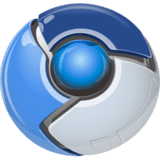Als Google seinen Chrome- Browser startete, wurde der größte Teil der Software als Open-Source-Version bereitgestellt und für das Chromium-Projekt freigegeben . Google Chrome bietet alle Funktionen von Chromium und bietet Funktionen wie automatische Updates sowie den integrierten PDF-Viewer und Flash-Player.
While precompiled binaries are available for Google Chrome for Windows, Mac, Linux, Android and iOS, the Chromium browser does not release official binaries; users can either build from source , or find downloadable binaries from other sources such as Ubuntu’s official repositories or third-party websites. The most common reason Chromium users cite for their preference of the browser over Google Chrome is better privacy — Chrome includes some trackers that send anonymized usage data to Google.
Comparison chart
| Chromium | Google Chrome | |
|---|---|---|
 |
 |
|
| License | MIT License, BSD License, LGPL , MPL/GPL/LGPL, and MS-PL. | Free under Google Chrome Terms of Service |
| Website | www.chromium.org | www.google.com/chrome |
| Developer | The Chromium Project | Google Inc. and open source contributors to Chromium |
| Flash player | Not built in; requires a plugin | Plugin is built-in; can be disabled |
| Media codecs supported | Vorbis, WebM, Theora | Vorbis, WebM, Theora, AAC, MP3, H.264 |
| Related software | Chromium OS | Chrome OS |
| PDF viewer | Not built in; requires a plugin | Plugin is built-in; can be disabled |
| Print preview | No | Yes |
| Auto update | No | Yes |
Google Chrome features not found in Chromium
The following features of Google Chrome are not included in Chromium:
- Google Update, an auto-update system for the browser
- Built-in PDF viewer
- Print preview
- Integrated Flash player, and
- Media codecs to support H.264, AAC and MP3 formats (H.264 support may soon be eliminated in Google Chrome)
Other differences include an option for usage stats and crash reports to be automatically sent to Google servers , as well as occasional advertising from Google, such as for the Chromebook. Even with these features, Google Chrome still follows the minimalist web browser style, which promotes lighter, easy to view interface.
<iframe width=”450″ height=”253″ frameborder=”0″ allowfullscreen src=”https://www.youtube.com/embed/ik7QS8F5K6s?iv_load_policy=3&rel=0″></iframe>
Installation Binaries (software you can use)
Google Chrome offers executable binaries for all major platforms — Windows, Mac OS X and Linux . Where applicable, both 32-bit and 64-bit binaries are provided. This makes it very easy for users to download and start using the software.
Things are a little different for the Chromium browser. The official website provides the source code, as well as instructions on how to compile it and build the application from the source. Instructions are available for Windows , Mac OS , Linux , Android and iOS . Chromium binaries are also provided by third parties. For Mac, Chromium binaries are binaries are available on FreeSMUG .
Chromium for Linux community builds
Linux distributions like Ubuntu offer Chromium binaries in their public repos (repositories) or sometimes bundles with the distro as pre-installed software. Debian, FreeBSD, Lubuntu, Puppy Linux and Ubuntu offer Chromium as available or default web browser. Arch Linux and Gentoo Linux set Chromium as an official repository while being an unofficial repository for Fedora .
Some developers maintain forks of Chromium that offer more features. Joli OS offers a rebranded version called Nickel.
Devices using Chromium and Chrome
Google Chrome and Chromium are available not just for laptops and desktops but also for tablets and Android and iOS smartphones. Chrome is now the default browser on Android phones. Chrome is available for non-RT Windows 8 devices both as a traditional app and a “metro” app. A version of Chrome is also available for iOS. Availability on such a plethora of devices lets Google offer some features with Chrome that are not available on Chromium, notably syncing via “Sign in to Chrome”. Users can seamlessly access their open tabs on one device when they move to a different device, as long as they are signed in (to the Chrome browser, not just to Google.com) using the same Google account on both devices.
Chromium also runs on mobile devices with its availability for Android, MeeGo’s netbook version and Maemo 5 mobile OS for Nokia.
Chromium OS
Chromium OS is a lightweight Linux-based operating system that uses the Chromium browser as the primary user interface. It is meant for users who spend most of their time on the web.
Google’s Chrome OS is a customized version of Chromium OS. It should be noted that Google is the original developer, primary contributor and the lead maintainer of both Chrome and Chromium.
References
- The Chromium Projects (Chromium browser and Chromium OS)
- Google Chrome
- Wikipedia:Chromium_(web_browser)
- Wikipedia:Google_Chrome
- Chromebooks (Chrome OS devices) on Amazon